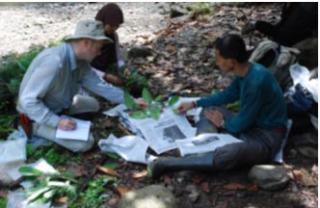Floristic Inventory In Tropical Countries
Published on 9 February 2010 in Ecosystems and biodiversity

Introduction
Our planet is home to an estimated 13 million species. However, to date only 1.7 million have been described, and our understanding of these organisms is highly variable across different groups. Tropical forests contain much of the world's species diversity, but they are also some of the most threatened. Our objectives are to use the collections and expertise held in Scotland at RBGE and the collaborations we have established across the tropics to generate information needed for decision-making in conservation and sustainable use of biological diversity in tropical countries.
Recognising that RBGE cannot provide detailed biodiversity support in all countries our work is focused on geographic areas and ecosystems in which we have expertise, that are the most poorly understood floristically and which have a strong demand for improved botanical skills, facilities, and capacity building. Many countries such as Indonesia, Brazil, Congo are recognised biodiversity “hotspots” (Myers et al., 2000) and their destruction accounts for a large amount of global CO2 emissions (Ryan, 2009) .
Conservation planning requires inventory data to determine plant species distributions. In turn inventories rely on taxonomic research (the classification and naming of organisms) to provide the reference system for organisms and a framework for identifying and discussing the elements of biodiversity. For this reason much of our inventory work involves taxonomic research such as the collection and description of new species. This requires a detailed knowledge of plant groups and as such we are often best placed to propose IUCN conservation assessments for many species.
An important aspect of our research is making the taxonomic, floristic and inventory information produced available to a wide range of end users. This includes traditional publications as well as online access.
Key Points
Inventory research in tropical countries is needed to help make informed conservation policies. RBGE holds the expertise and collections essential to support biodiversity protection in tropical countries.
A lack of taxonomic information, facilities and skilled human capacity, are widely considered to be limiting factors for conservation and sustainable development of tropical forests.
Research Undertaken
RBGE is providing taxonomic training for researchers in the neglected biodiversity hotspot of Lao PDR, producing checklists for the Dzanga-Sangha Reserve, Central African Republic, documenting tree diversity and agroforestry information for re-afforestation in the Peruvian Andes, undertaking research into the biodiversity, biogeography and conservation of Neotropical Seasonally Dry Ecosystems, and producing a wide range of taxonomic and floristic publications for the forests of Indonesia, Malaysia and Thailand.
Policy Implications
The research provides policy relevant information for National, UK and global initiatives such as the Convention on Biological Diversity, the Global Strategy for Plant Conservation, the Darwin Initiative Programme, the International Union for the Conservation of Nature, the Global Taxonomy Initiative and the Scottish Government Rural and Environmental Research and Analysis Directorate (Strategy for Environment, Biology and Agriculture-International Plant Biodiversity).
As Scotland continues to develop its distinctive global identity (Scottish Governments International Framework, International development policy) research highlighted here can help demonstrate the relevance and contribution its research institutes make to global biodiversity initiatives.
Acknowledgements
The Scottish Government Rural and Environmental Research and Analysis Directorate is gratefully acknowledged for supporting much of this work. Funding has also been provided by DEFRA’s Darwin Initiative, the EU’s SYNTHESYS programme, the French Ministère des Affaires Etrangères, Fonds de Solidarité Prioritaire, “Sud Expert Plantes” and the Carlsbergfondet and Augustinus Fonden, Denmark.
Author
Dr Peter Wilkie, Royal Botanic Garden Edinburgh p.wilkie@rbge.org.uk





